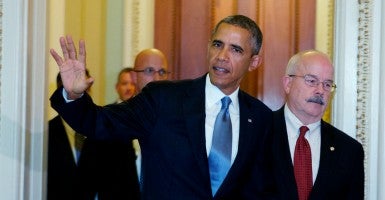It became her mantra. The U.S. border with Mexico, Janet Napolitano would say, “has never been more secure.” First uttered in 2010 during Congressional testimony, she repeated it often for the remainder of her tenure as Homeland Security Secretary.
Even four years ago, not everyone agreed. True, illegal border crossings had dried up in some sectors. But elsewhere new transit corridors had opened. And cartel activity had never receded. Smugglers used everything from tunnels to ultralight aircraft to funnel people and drugs north, and money and guns south.
Still, there was no question that, in 2010, border interdictions were rising, and the total number of people unlawfully present in the United States was declining. The drop started even before Napolitano got on the job. A 2008 report by the Washington-based Center for immigration Studies estimated the number had fallen 1.3 million since 2007, an 11 percent decline.
The report cited “strong indications” that stepped-up enforcement played a major role. Others pegged the decline to disappearing jobs–a result of the recession. Doubtless both factors were at play. Nevertheless, Napolitano trumpeted the numbers, largely to argue that a general amnesty for illegal immigrants was now perfectly appropriate. After all, with the border secure, more illegal immigrants could not possibly follow!
Today, the flood of unaccompanied minors illegally crossing the border makes Napolitano’s declaration look foolish. Last year, the Department of Health and Human Services reported it had custody of about 2,000 minors who had entered illegally, without a parent. This year more than 52,000 unaccompanied children have been apprehended at the South Texas border alone.
Why the dramatic upsurge? It comes following the president’s 2012 declaration that his administration would defer, virtually automatically, deportation of minors unlawfully present in the U.S. Over the last year, “coyotes” have been using that promise as a marketing tool for their people smuggling business. Coupling this announcement with disastrous policies towards El Salvador,Honduras, and Guatemala — the three countries from which most of these children come — Obama has done much to undermine all the enforcement measures that had stemmed the tide of illegal migration.
Now Washington has stepped in with three proposals to solve the problem.
First, the president has asked for $3.8 billion in “emergency” spending. That’s a laughable request intended mostly as a sound bite for the White House to claim it is doing something. Little of the money would go toward making the border more secure. A lot would go to hiring immigration judges — a two-year process that hardly qualifies as emergency spending. If there are legitimate additional needs Congress should just address them in the annual appropriations bill.
Second, some want to cut foreign aid to punish El Salvador, Honduras, and Guatemala. But, Congress has to be careful not to gut programs that help those nations battle the gangs and cartels that have made life there so difficult. Indeed, by withholding security assistance funds over the last few years, Washington has inadvertently fueled the problems many Central Americans seek to flee.
Third, there is a move to amend current law to allow for expedited removal of minors from countries that are noncontiguous with the United States. If done right, that policy change would actually help over the long-term. Even under expedited removal, U.S. officials must fully consider a child’s safety in their decision-making. After all, once the U.S. takes custody of a minor, it’s responsible for that child.
Today’s border crisis offers an important lesson: When an administration ignores the law or only pretends to enforce it, no one pretends to obey it. The consequences are self-evident.
Originally posted on the Washington Examiner.































